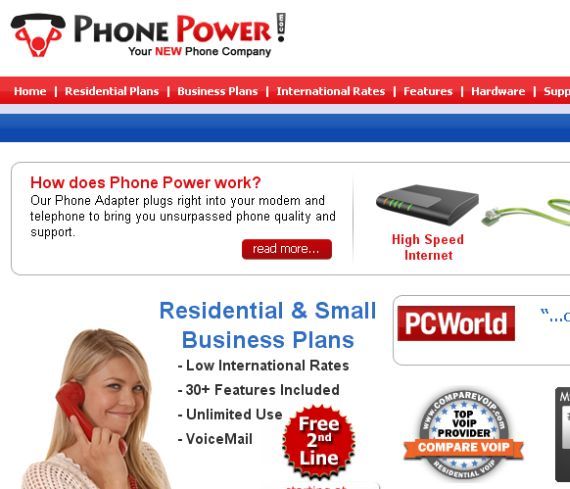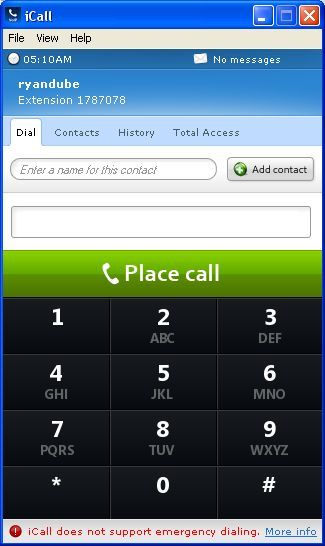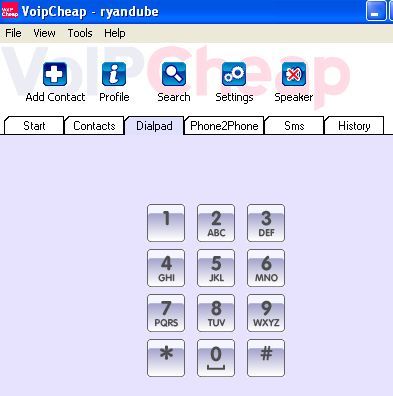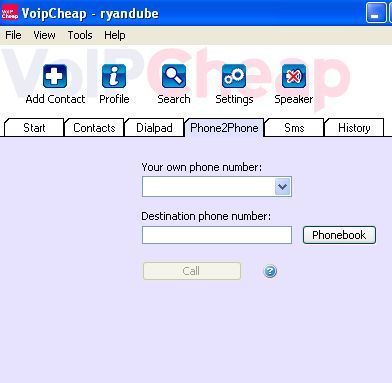I still remember the day that I first realized that traditional landlines were going to be a thing of the past. I was sitting at the dining room table paying our monthly bills, and for the first time in a very long time I decided to stop and take a good, hard look at the gritty details within the phone bill.
While we'd hardly made 25 dollars (U.S.) worth of long distance calls that month, our bill after taxes, fees and surcharges came to just over 45 dollars. Not being a very big fan of chatting on the phone for hours on end to begin with, I started searching for alternatives to the landline monopoly in this area.
For the purpose of this article, I'm going to lay out 3 alternatives to local phone companies that you can use, depending on what technologies you like best or what your particular situation calls for. After reviewing these three alternatives, I'll share with you what option we chose back then, as well as a more dramatic move we're planning within the next few months.
The Power of VOIP - A Standard Alternative to Local Phone Companies
One of the most common alternatives folks choose when they get sick of getting stuck with an exorbitant phone bill every month is the VoIP solution offered by the local cable company. These services are being offered more and more in local communities throughout the country, and more people every day are taking advantage of it.
There are a few downsides that simply scare some people too much. If you lose power you're out of luck. Some companies try to compensate for that by adding a battery backup to the VoIP enabled cable modem that keeps the phone service operational or an hour or so, even if your home loses power. This is a great solution, but our experience has been that this backup doesn't always work, especially when outages are widespread. On the flip-side, if you have cellphones as a backup, this drawback to VoIP service may not really matter to you.
The benefits of VoIP far outweigh that one major drawback. Monthly service is very cheap and typically unlimited throughout your home country (and sometimes other parts of the world). There are no erroneous fees or charges thrown in, and the extra "features" such as call forwarding, caller ID, and voice-mail all come free with a standard package. Your local cable company may have a digital phone offering, and it might be cheap enough to tempt you. Make sure to ask about any "all-in-one" deals where you get a discounted rate for purchasing cable TV, Internet and phone service through the one company and you'll save even more.
Of course, we wouldn't be MakeUseOf if we didn't offer you other ways to make use of the Internet - and there are lots of great non-cable company VoIP services out there that offer stellar phone service over the Internet. One of the highest rated VoIP company that has received rave reviews by customers is Phone Power.
Phone Power will send you free hardware and lets you have a free 2nd line. Calls are unlimited and the plan is cheaper than the competition, including Vonage. The service will work in any country in the world where there's a broadband connection, the only drawback is that the company only ships the equipment to a U.S. address and only accepts payment from U.S. credit cards.
There are ways to get around those limitations, such as having someone in the U.S. send you the equipment and bounce payment through U.S. accounts, however it's unfortunate that the company doesn't better accommodate the worldwide market. If you're not sure what VoIP service to go with, make sure to check out Cheapest-VoIP to check for rates in your part of the world.
Luckily, worldwide VoIP consumers have additional choices beyond the standard VoIP services that offer not only "discounted" rates - but absolutely free calls all across the world. Read on.
Make Free Internet Phone Calls Using Your PC
One of the most significant competitors to the large VoIP services are smaller companies that are offering telephony services almost exclusively through the Internet. Skype started this trend, and I recently compared Skype and Gizmo as two solutions. But since increasing their rates, Skype consumers are now looking for other free-call solutions. The most significant drawback to these web-based services is that they don't typically send you hardware that allows you to make calls through the regular landline phones in your house (although there are ways to do that - we'll get that that in a minute).
However, since most VoIP consumers care less about the power outage issue, and they are also usually avid computer users - many of these consumers are more willing to give up the few additional benefits of the major VoIP telephony services in exchange for the ability to make absolutely free (or at least tagt cheap) calls just by using a headset with your PC. MUO covered Flashphone before, a flash-based Internet app where you can place free calls over the net.
There are two services I'd like to touch on that I feel are the best solutions, because they compete best with hardware-based VoIP services. The first is all iCall, a fully web-based application that you install on your desktop or laptop PC where you'd like to send and receive calls.
The iCall interface is very simple and clean, and the service comes with cool features including personalized voicemail and call forwarding. You receive calls by giving your friends and family one of the iCall access numbers. When people call that number, they can enter in your extension.
Like many software-based VoIP solutions, "free calling" isn't completely free. Using iCall you can make free 5 minute phonecalls all day, every day. For a guy like me who usually has 2 minute phone calls, I'm cool with that. But for your teenage daughter who likes to talk for 3 or 4 hours with her boyfriend who lives across the country - forget about it.
Luckily, even the paid service through iCall is about half the cost of PhonePower, with unlimited calling in the U.S. and Canada and really cheap calls across the world. Unfortunately the software is only offered for Windows.
Want an even better solution? Leave it to the folks in the UK to develop a truly free software-based VoIP solution, which goes by the name of VoIPCheap.
Like every online VoIP service, there are limitations to the free calls with VoipCheap as well. You're restricted to 300 free minutes each week (that's 1,200 minutes a month), but if you find that the free service isn't enough you can buy credits (sort of like how Skype works).
Even if you end up paying for calls, you'll pay nowhere near what you'd have to pay if you used your regular landline. Would you rather use a regular phone to make calls instead of your computer headset? You can either invest in a phone-2-pc adapter or USB phone that connects to your computer, or you can use VoipCheap's solution, which is a call initiated through the Internet to any phone you want.
In VoipCheap, you just click the Phone2Phone tab and type in your phone number (use your cellphone) and the number of the person you want to call. VoipCheap dials your cellphone first. When you pick up, it dials the other line for you...pretty simple, and you've just removed the need for your local phone company.
Cancel Landline and Switch to Mobile Phone
I've always loved using VoIP services, especially since overall voice quality has dramatically improved in recent years. The solution my wife and I ultimately chose was to go with our local cable company through an all-in-one package that included a hardware-based, battery backup unlimited calling plan. This worked well over the past few years, but it still feels like our phone service should cost less - after all, we're already paying for our mobile phone service. But then again, maybe that's the solution.
Recently, I noticed a few more cell towers going up in our area, and soon our the mobile signal strength at our home should be at full potential. This introduces a whole new alternative to local phone companies (and cable companies) for phone service - exclusively using the mobile phone for all calls. Too extreme? In an upcoming article I'm going to examine different ways to save even more by completely canceling your home phone service and using VoIP technologies to not only switch to your cellphone for all calls, but also to eliminate paying for mobile per-minute charges in the process.
Have you got off traditional landline service yet? What solution did you choose? Share your experiences with other readers in the comments section below.





